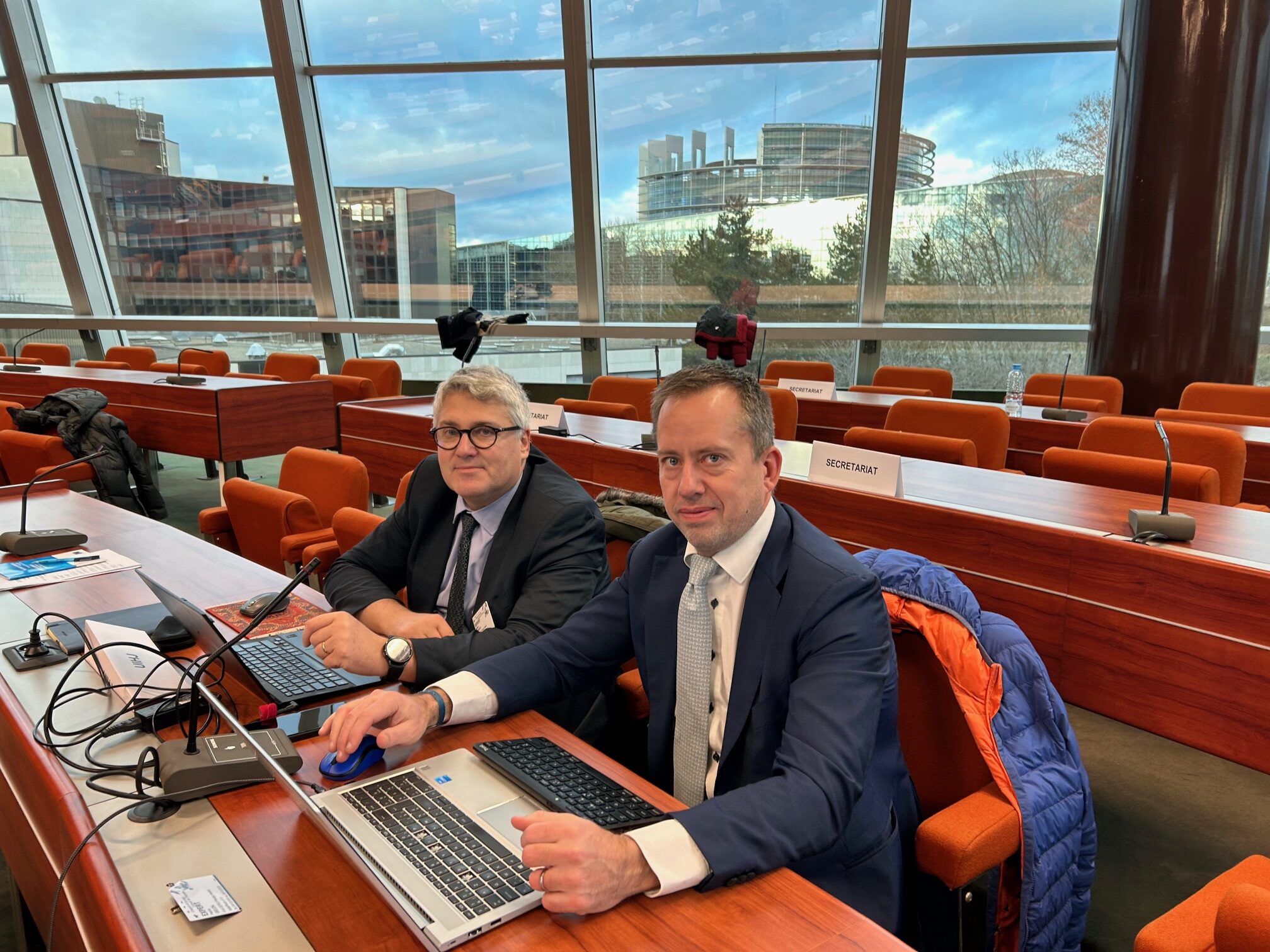The UIHJ, represented by Patrick Gielen, Secretary of the Board, and Mathieu Chardon, Secretary General, participated in the 41st Plenary Meeting of the CEPEJ at the headquarters of the Council of Europe in Strasbourg, on 4 and 5 December 2023, in its capacity of CEPEJ Permanent Observer Member.
In his introductory speech, Christophe Poirel, Director of the Human Rights Directorate of the Council of Europe, insisted on the importance of looking at artificial intelligence in the context of justice. He welcomed the organisation, during the 41st CEPEJ Plenary Meeting, of a session on artificial intelligence in the service of justice. He also recalled that the CEPEJ tools are used as part of the cooperation and assistance activities of the Council of Europe to help its member States adapt, develop and modernise their judicial institutions. Francesco Depasquale, President of the CEPEJ, thanked Mr Poirel for his intervention as well as the CEPEJ secretariat for its work.
The session on “Artificial Intelligence in the Service of Justice – concrete examples of implementation” was moderated by Marek Świerczyński (Poland), professor of law, member of the CEPEJ Artificial Intelligence Advisory Board (AIAB). Four themes followed by a discussion were addressed:
- “Artificial intelligence support of the processing of mass trials”, by Jan Spoenle (Germany), Judge at the Stuttgart Court of Appeal, member of the CEPEJ Pilot Court Network;
- “Generative artificial intelligence for a practical guide to access to Justice (GPJ)”, by Pedro Alexandre Monteiro Almeida (Portugal), International Cooperation Unit, Ministry of Justice of Portugal, member of CEPEJ-GT-CYBERJUST;
- “The anonymisation of court decisions through artificial intelligence (ANOM)”, by Jacques Bühler (Switzerland), Deputy Secretary General of the Swiss Federal Tribunal, member of the CEPEJ and of the CEPEJ European Cyberjustice Network;
- “Voice to text, machine learning applied to judicial hearings”, by Javier Hernández (Spain), Deputy Director General for Digital Transformation, Ministry of Justice.
The ongoing work of the CEPEJ Working Group on Evaluation of judicial systems (CEPEJ-GT-EVAL) was presented by its President, Jaša Vrabec (Slovenia), namely the evaluation grid for European judicial systems for the 2024 cycle (2022 data) and the preparation of the report, data collection and peer review, use and dissemination of the report, cooperation with the European Union, study on the functioning of judicial systems in the Member States of the European Union (EU Justice Scoreboard), Eurostat data, Dashboard Western Balkans, and the Justice Dashboard Eap (Eastern Partnership countries).
The joint work of the CEPEJ Working Groups on Quality of justice (CEPEJ-GT-QUAL) and on Cyberjustice and artificial intelligence (CEPEJ-GT-CYBERJUST), in the area of artificial intelligence, was presented by Maria Giuliana Civinini (Italy), President of the CEPEJ-GT-CYBERJUST, notably the Resource Centre on Artificial Intelligence and Cyberjustice, and the Artificial Intelligence Advisory Board (AIAB). The specific work concerning the CEPEJ-GT-CYBERJUST included, for its part, the draft Guidelines on alternative methods of online dispute resolution.
The work of the CEPEJ Working Group on Quality of justice (CEPEJ -GT-QUAL) was presented by its president, Joao Arsenio de Oliveira (Portugal), in particular the follow up to the European Ethical Charter on the use of artificial intelligence in judicial systems and their environment (Assessment tool for the operationalisation of the Ethical Charter on artificial intelligence), and how to assess the quality of the work of judges (comparative analysis).
Concerning the CEPEJ Working Group on judicial time management (CEPEJ-SATURN), its President, Giacomo Oberto, discussed the cases weighting in public prosecution services, the database on backlog reduction practices, tool to analyse the different timeframes according to the stages of the procedure, and the follow-up to the adoption of the Backlog Reduction Tool.
Among the other subjects discussed during the meeting, the CEPEJ presented an online training project concerning the CEPEJ tools, and Francesco Depasquale unveiled the CEPEJ activity program for 2024-2025.
Finally, as part of the presentation of the activities of the CEPEJ observer members, Mathieu Chardon announced that the UIHJ proposed to organise with the CEPEJ the 3rd Global Forum on Enforcement in December 2024 on the occasion of the 15th anniversary of the CEPEJ Guidelines on Enforcement, on the theme: “Artificial intelligence, human rights and enforcement in civil and commercial matters: what guarantees for litigants”. Patrick Gielen announced the organisation of the 25th International Congress of Judicial Officers in Rio de Janeiro, Brazil, from 7 to 10 May 2024 on the theme: “The Judicial Officer: The Trusted Third Party” and invited all participants to attend this event.






